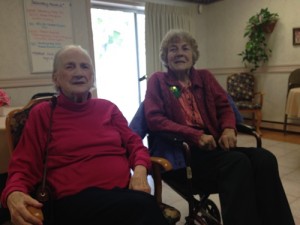 Two weeks before Easter 2015 and my mother and I went on a special trip. This trip was planned for a week earlier and it was postponed due to more of the same for the winter of 2015-bad weather. My mother needs help getting into and out of the car and she quickly gets cold, a symptom common to many of those over 80, so wind, freezing rain and snow put a damper on our plans. My father and I agreed we would wait for me to take mom out.
Two weeks before Easter 2015 and my mother and I went on a special trip. This trip was planned for a week earlier and it was postponed due to more of the same for the winter of 2015-bad weather. My mother needs help getting into and out of the car and she quickly gets cold, a symptom common to many of those over 80, so wind, freezing rain and snow put a damper on our plans. My father and I agreed we would wait for me to take mom out.
The days before the trip were interrupted by more than bad weather. First there was a call with concerning result from lab work. My mother’s PT INR was elevated to a critical level. The PT INR, or Prothrombin time (PT) is a blood test that measures how long it takes blood to clot. A prothrombin time test can be used to check for bleeding problems. PT is also used to check whether medicine to prevent blood clots is working. INR stands for International Normalized Ratio which allows doctors to understand results even when they come from different labs or tests.
Every Wednesday evening I get a call with a report on my mother and father’s PT INR. Both have been on warfarin, a medicine used to reduce the risk of blood clots. For my mother and my father atrial fibrillation increases the risk of blood clots forming. The difficulty arises when the medicine taken to prevent blood clots thins the blood too much and clotting time is significantly slowed. My mother’s PT INR was 7.49, well above the desired range of 2-3. In fact it was critical.
Measures were taken to aid in blood clotting but it may have been too late. The days following were days of declining health for mom. She stopped eating, slept 22 out of 24 hours every day, and showed evidence of a transient ischemic attack (TIA). A TIA is a temporary stroke that will usually resolve itself. The biggest worry for me was the uncertainty if this was temporary or a permanent change, or worse. Mom reached a point where she could not lift her left arm off her lap, she could no longer assist in getting up to standing from sitting or take any steps. She fell and hit her head.
One of the complications of aging is accumulated medications. As we get older we add doctors to our list of experts, all with the intention of resolving or at a minimum improving the quality of our life. A rheumatologist for arthritis, cardiologist for heart worries, neurologist for cognitive function, and a primary care physician to top it off. Each adds a medication and the list can grow. But every medication has side effects.
My mother rebounded and a week later she was back to her good old self: an 82 year old with 40 years of arthritis, 2 strokes, vascular dementia, and 2 heart attacks, an 82 year old who loves her family and had a great visit with her sister. We met with her cardiologist and after much consideration we took mom off of some medications that are now more risk than benefit. We are faced with the knowledge that at some point our bodies cannot be repaired. But our relationships last through all things and as her sister exclaimed with joy “we are all related.”

